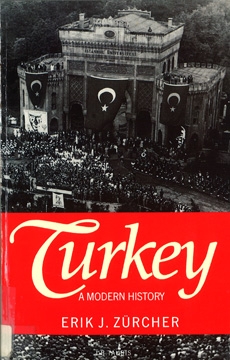|
PREFACE
The best way to master a subject is to try to teach it. This is a truth I discovered years ago when, fresh out of university, I was charged with teaching students barely younger than myself Turkish. Time and again these students made me realize how little I knew about the intricacies of the Turkish language. Some 15 years on I rediscovered this truth when Dr Lester Crook invited me to write the present volume, the primary purpose of which is to serve as teaching material.
Although by then I had been researching and writing for years on the period of transition from the Ottoman Empire to the Turkish Republic, again, it made me realize how much there was I didn’t know and how much there was that wasn’t known at all. Again, I learned as I wrote. Therefore, if reading this book is only half as rewarding to you, the reader, as writing it has been to me, the author, it will have amply served its purpose.
I have always found that in the academic profession many of the most useful findings are the outcome of informal discussions with one’s colleagues and students. Their contributions mostly remain anonymous, since they are submerged into the unconscious, only to reappear as one’s own bright ideas. Apart from these anonymous contributors, a synthetic work such as this is, of course, heavily dependent on the authors of the monographs which have been used in the synthesis. Their names, and those of their works, are to be found in the bibliographical survey at the end of the book, which shows the extent of my debt.
A number of people made specific contributions through their comments on parts of the text: Dick Douwes of the Catholic University of Nijmegen, Professors Jan Lucassen and Rinus Penninx of the University of Amsterdam, and Dr William Hale of the School of Oriental and African Studies at the University of London. Parts of the book also reflect the work of a number of former students, notably the MA theses of Nicole van Os, Jacqueline Kuypers and Anneke Voeten.
Dr Lester Crook has contributed greatly to any merits the book may have by his meticulous and informed reading of, and commenting on, the text.
The original suggestion for this book came from my dear friend Dr Colin Heywood of the School of Oriental and African Studies at the University of London, who pointed out that there could be a need for a book such as this 30 years after the publication of Professor Bernard Lewis’s epochal Emergence of Modem Turkey. I can only hope the result is somewhat as he expected it to be.
Saskia’s contribution has been much greater than the patience and forbearance for which wives and partners are usually commended in prefaces.
Nijmegen/Amsterdam
August 1992
Introduction: Periodization,
Theory and Methodology
Periodization, dividing the past into periods which can be clearly identified and which differ from one another in a recognizable way, is a subject for interminable discussion. The same goes for the identification of the landmarks and turning points which are supposed to separate the periods. What makes this activity on the part of the historian such a debatable issue, is the obvious fact that every turning point and each landmark, is both the start of a new development and the culmination of an earlier one.
Nevertheless, periodization, however arbitrary and subject to the personal preferences of the historian, is an unavoidable and even indispensable tool to give shape to the past, which would otherwise consist of an undifferentiated mass of facts and figures. The very title of this book implies that there is such a thing as modern history (or even modern Turkey) and hence is the result of periodization.
For periodization to be a valid instrument, it has to comply with two separate demands. Firstly, it must have explanatory value. Like comparisons, periodizations in principle are unlimited in number, but they only serve a purpose if they allow us to partition the stream of events in such a way that important developments become visible. Secondly, periodization should reflect the actual developments of the period under description. It cannot be a wholly inductive process. This begs the question of which developments the historian sees as important enough to warrant basing his periodization on, or in other words, which among the great mass of facts he recognizes as ‘historical facts’.
Of course, in any given field there are traditional divisions which have become so widespread that the innocent reader tends to accept ...
| 